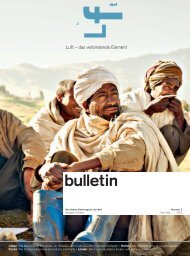Healthcare
Entering the digital era Global Investor, 02/2012 Credit Suisse
Entering the digital era
Global Investor, 02/2012
Credit Suisse
- No tags were found...
You also want an ePaper? Increase the reach of your titles
YUMPU automatically turns print PDFs into web optimized ePapers that Google loves.
GLOBAL INVESTOR 2.12 — 25<br />
“The tools that we have for sequencing<br />
genomes now allow us to look at the<br />
genome of any cancer and actually see<br />
what derangements it contains.”<br />
Which enables you to do what?<br />
Eric Green: Everybody has known for<br />
some time that cancer is not one disease.<br />
People with the same apparent type of<br />
cancer can have very different outcomes.<br />
If you look at those cancers under a microscope,<br />
they look identical. But when you<br />
look at their genomes, they can look completely<br />
different. That information makes<br />
it possible, say, to predict a good outcome<br />
versus a bad one.<br />
So we cannot yet say we have<br />
better therapies?<br />
Eric Green: In most cases, no, but at<br />
least we have better ways of predicting<br />
outcomes. Worldwide, there are dozens of<br />
different cancer sequencing projects where<br />
many tumors of a particular type of cancer<br />
are being collected, sequenced and catalogued.<br />
We think that in the next few years,<br />
these efforts will change the face of<br />
cancer diagnostics for some cancers, and<br />
(fingers crossed!) maybe also provide better<br />
insights for how to treat cancer.<br />
It’s not just disease outcomes that are<br />
different. People respond differently<br />
to drugs too.<br />
Eric Green: How people respond to<br />
medication is also largely genetic. It has to<br />
do with how we metabolize drugs and with<br />
other things about how the drugs are acting.<br />
And we’re learning how to predict that in<br />
advance. There is the whole field of “pharmacogenomics”<br />
that basically uses information<br />
about an individual’s genome to determine<br />
which medication they should get.<br />
Pharmacogenomics is already standard care<br />
for certain medications involved in the<br />
treatment of AIDS, asthma and some types<br />
of cardiovascular disease.<br />
The cost of genome sequencing<br />
has fallen dramatically. Why?<br />
Eric Green: When the Human Genome<br />
Project ended in April of 2003, our institute<br />
published a paper describing a vision for<br />
the future of genomics and calling for the<br />
development of revolutionary new technologies<br />
for sequencing DNA. In fact, we asked,<br />
wouldn’t it be incredible if we could come<br />
up with a technology that would allow us to<br />
sequence a human genome for a thousand<br />
dollars?<br />
You had just sequenced the first<br />
human genome for a billion dollars!<br />
Eric Green: Which is why setting a goal<br />
of sequencing a human genome for a<br />
thousand dollars was, frankly, nothing short<br />
of audacious. But we knew the cost had<br />
to come down. We gave out millions of dollars<br />
to all sorts of scientists, hoping that they’d<br />
take risks and come up with some crazy new<br />
ideas. The private sector saw this as a huge<br />
opportunity as well, and poured in lots of<br />
money. Good ideas emerged, they worked,<br />
and what cost a billion dollars only ten years<br />
ago is now down to just a few thousand.<br />
What was the most surprising<br />
finding about the human genome?<br />
Eric Green: How few genes we have!<br />
For a long time, we figured that, because<br />
we are so complex and smart, the human<br />
genome would have many more genes than<br />
simpler organisms like fruit flies and worms.<br />
But in fact, we have around 20,000 genes<br />
(a few thousand more than a fruit fly<br />
and roughly the same number as a mouse).<br />
The other thing that’s been surprising is<br />
that the majority of the functional parts of<br />
our genome are not genes at all and do<br />
not directly code for protein.<br />
What do they do?<br />
Eric Green: We are still learning about<br />
those other functional parts. We know that<br />
many of them act like dimmer switchers,<br />
determining when and where and how<br />
much a given gene gets turned on, how<br />
much protein gets made and so forth. And<br />
that’s where we probably get most of our<br />
biological complexity.<br />
Earlier you mentioned that, aside from<br />
being able to predict response to this or that<br />
drug or treatment, one day, hopefully,<br />
we might even be able to make better drugs<br />
based on genomic information. What<br />
do we have to know to get to that point?<br />
Eric Green: I think it’s unrealistic to think<br />
about designing drugs just for us based<br />
on our own unique genomic makeup. That’s<br />
just not going to happen.<br />
What will happen?<br />
Eric Green: Genes act in complicated<br />
networks of pathways where A affects B and<br />
B affects C and C leads to D and so forth.<br />
And through genomics – the name we give<br />
to the discipline that studies the genome –<br />
we are learning about what pathways are<br />
altered in a given disease. And that immediately<br />
gives insight about what existing<br />
drugs or what newly developed drugs might<br />
be useful for compensating for that alteration<br />
in that pathway. So knowing which pathway<br />
is altered can actually be more important<br />
for developing therapies than just knowing<br />
what individual gene is broken.<br />
What has been the greatest<br />
disappointment of the genome?<br />
Eric Green: If there is a “disappointment,”<br />
it is that we are recognizing just<br />
how complicated the human genome is. It<br />
has been a bit of a reality check. Because<br />
it is not simply understanding the genes:<br />
my grandchildren, and probably my<br />
great-grandchildren, will still be interpreting<br />
and reinterpreting the human genome<br />
sequence. But it also means that the field<br />
of genomics is going to be a hot one for

















